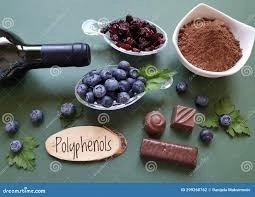our friends, polyphenols
Apr
13
Polyphenols are a diverse group of naturally occurring compounds found in plants. They are known for their antioxidant properties, which help protect cells from damage caused by free radicals. Additionally, polyphenols have been linked to various health benefits, including reducing inflammation, improving heart health, and potentially lowering the risk of certain chronic diseases such as cancer and neurodegenerative disorders.
Specifically, they neutralize free radicals which are naturally created unpaired electrons (but also created by air pollution, UV radiation or cigarette smoke). These unpaired electrons in our bodies can damage our cells, proteins, and DNA, leading to oxidative stress and life threatening diseases.
A March 18 2024 Medical News Today report referred to the health benefits of polyphenols to our gut. Research by National University of Natural Medicine in Portland, Oregon, based on data from the International Cohort on Lifestyle Determinants of Health (INCLD HealthTrusted Source), showed an increase of polyphenols in our diet leads to an increase in healthy gut bacteria such as Lactobacillus and a decrease in harmful bacteria among participants in the study.
Polyphenols are commonly found in foods like fruits, vegetables, tea, coffee, red wine, and dark chocolate.
Examples of polyphenols found in plants are:
Flavonoids: Found in fruits (such as apples, berries, and citrus fruits), vegetables (like onions and kale), tea, red wine, and cocoa. Subtypes include quercetin, catechins, and anthocyanins.
Phenolic acids: Present in fruits (especially berries), vegetables (like spinach and potatoes), whole grains, and some beverages such as coffee and wine. Examples include caffeic acid, ferulic acid, and ellagic acid.
Stilbenes: Found in grapes (especially in the skin), berries, peanuts, and red wine. Resveratrol is a well-known stilbene.
Lignans: Abundant in flaxseeds, sesame seeds, whole grains, and some fruits and vegetables.
Tannins: Present in tea, wine, nuts, berries, and some legumes. They contribute to the astringent taste in foods and beverages.
These are just a few examples, as polyphenols are widespread in the plant kingdom and can be found in various plant-based foods.
What do these polyphenols do?
Polyphenols such as flavonoids, have several beneficial effects on health:
Antioxidant activity: Flavonoids help neutralize harmful free radicals in the body, protecting cells from oxidative damage.
Anti-inflammatory properties: They can help reduce inflammation, which is linked to various chronic diseases such as heart disease, cancer, and arthritis.
Cardiovascular benefits: Flavonoids may improve heart health by promoting healthy blood flow, reducing blood pressure, and improving blood vessel function.
Immune system support: Some flavonoids have been shown to enhance the immune system’s response to infections and other challenges.
Potential cancer protection: Certain flavonoids have been studied for their potential anti-cancer properties, including inhibiting the growth of cancer cells and reducing the risk of tumor formation.
Neuroprotective effects: Flavonoids may help protect brain cells from damage, potentially reducing the risk of neurodegenerative diseases like Alzheimer’s and Parkinson’s.
Overall, including flavonoid-rich foods in your diet, such as fruits, vegetables, tea, and dark chocolate, can contribute to better health and well-being.
More on MCTs and polyphenols:
original post: https://herb-sprout.com/2024/03/19/our-friends-polyphenols/


